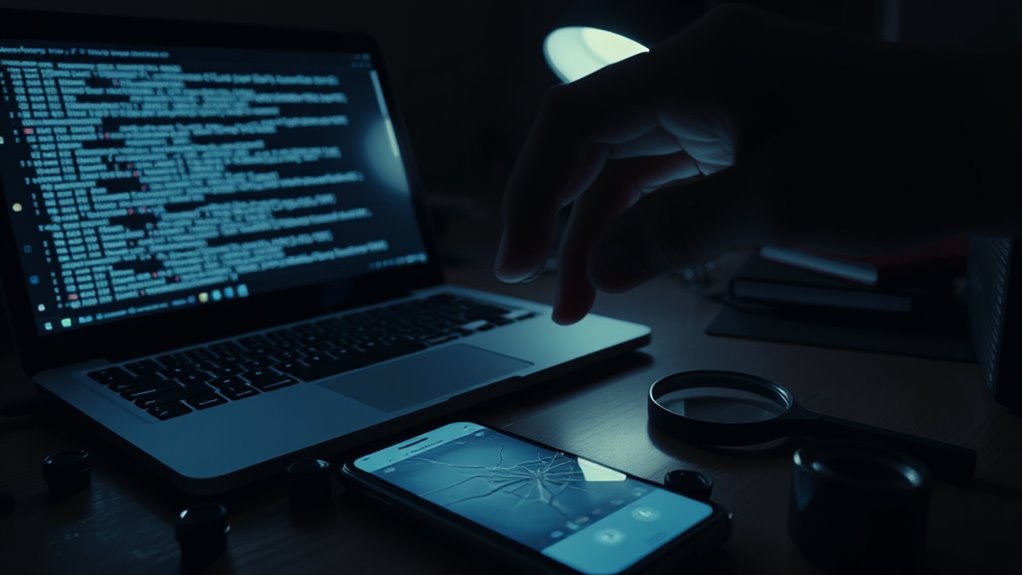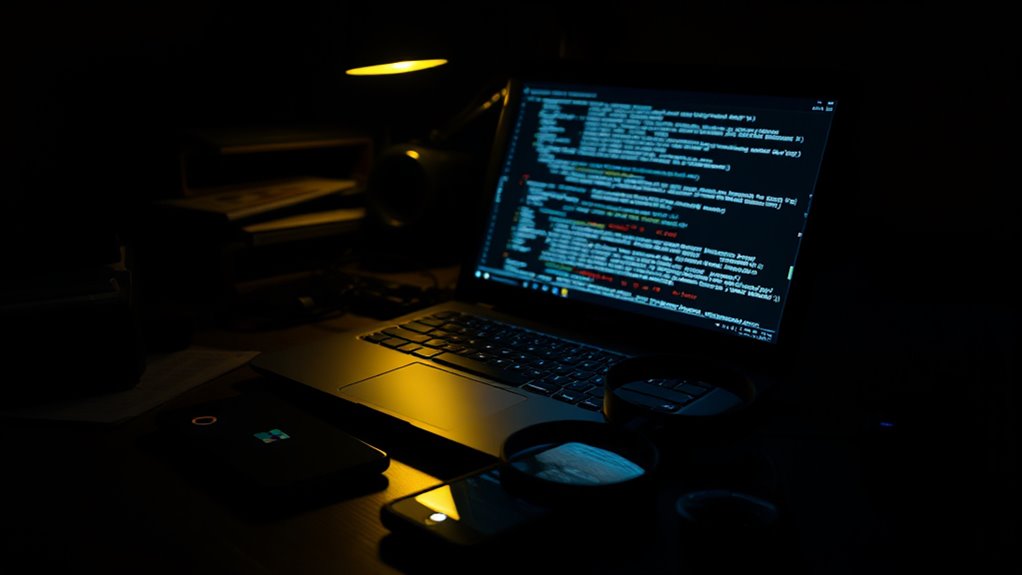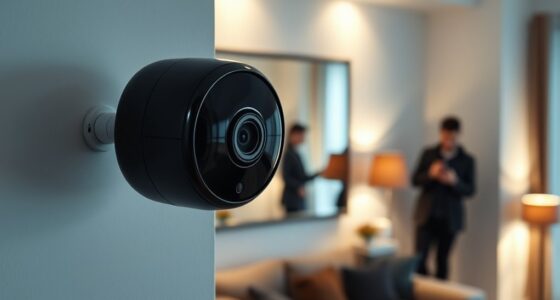Using spyware or snooping to catch a cheating partner is generally harmful, often illegal, and raises serious ethical concerns. It can break trust, damage relationships, and may lead to legal consequences if discovered. Instead, consider honest conversations or seeking professional help. If you keep exploring, you’ll find more about how to address trust issues ethically and protect your well-being without crossing boundaries.
Key Takeaways
- Using spyware without consent is generally illegal and can lead to criminal or civil repercussions.
- Invasive monitoring damages trust and may cause long-term relationship harm.
- Monitoring might be justified when protecting children or in cases of proven deception.
- Open communication and counseling are preferable alternatives to invasive surveillance.
- Weigh legal, ethical, and emotional risks carefully before considering tech-based snooping.

Spyware and snooping are growing threats in today’s digital world, secretly invading your privacy and compromising your personal information. These tools can track your online activity, access your private messages, and even monitor your location without your knowledge. It’s understandable to feel betrayed or suspicious if you suspect your partner of infidelity, but the question remains: is it ever okay to use tech to catch a cheater? The answer isn’t straightforward, and it depends on your circumstances, values, and the potential consequences.
First, consider the legal and ethical implications. In many places, installing spyware on someone’s device without their consent is illegal, even if it’s your partner. You could face criminal charges or civil lawsuits if caught. Beyond the law, there’s a moral question about trust and privacy. If you’re resorting to invasive methods, it might indicate a breakdown in communication or trust within your relationship. Using technology to snoop can temporarily satisfy your curiosity, but it often damages the foundation of honesty that relationships are built on. It can also lead to unintended consequences, like exposing sensitive information or causing unnecessary conflict.
Installing spyware without consent is often illegal and damages trust, risking serious legal and relational consequences.
That said, some situations might justify cautious use of technology. If you have children and suspect they’re in danger online, monitoring might be justified to protect their safety. Similarly, if you’re in a business relationship or dealing with a partner who has a history of deception, some might argue that discreet monitoring is necessary. But even then, it’s essential to weigh the risks and consider less invasive alternatives first. Open communication, counseling, or even hiring a private investigator with legal clearance can sometimes achieve the same goal without crossing ethical boundaries.
You should also reflect on what you hope to accomplish with spyware. If your primary goal is to confirm suspicions or gather evidence to confront your partner honestly, you might be better off addressing your concerns directly. Trust is fragile, and violating someone’s privacy—even in the name of catching a cheater—can have long-lasting repercussions. Remember that once trust is broken, it’s difficult to repair. Additionally, understanding the trustworthiness of Patchology can help you make more informed decisions about digital security and privacy in general.
In the end, whether or not it’s ever okay to use tech to catch a cheater depends on your personal values and circumstances. While the urge to uncover the truth is natural, you need to balance that against the potential harm and ethical considerations. Sometimes, seeking professional help or having an honest conversation can be more effective and respectful than invading someone’s privacy with spyware. Technology can be a tool, but it shouldn’t replace the fundamental trust and honesty that healthy relationships require.
Frequently Asked Questions
Can Spyware Be Legally Installed Without the Target’S Knowledge?
You might wonder if spyware can be legally installed without someone’s knowledge. Legally, it’s generally illegal to install spyware on someone else’s device without their consent, especially if it involves invading privacy or bypassing security measures. Laws vary by jurisdiction, but in most cases, doing so without permission can lead to serious legal consequences. Always consider privacy rights and seek legal advice before attempting any form of monitoring.
What Are the Psychological Impacts of Spying on a Partner?
You might wonder about the psychological impacts of spying on a partner. If you do, you’ll likely feel guilt, anxiety, or mistrust, which can damage your mental health and your relationship. Constant surveillance can lead to paranoia and stress, making it hard to trust again. It’s important to reflect on these feelings and consider healthier ways to address concerns, rather than resorting to invasive tactics.
Are There Alternative Ways to Confirm Infidelity Legally?
You want to confirm infidelity legally, and there are better options than spying. Consider hiring a private investigator who can gather evidence within legal boundaries. You can also look for concrete signs or have an honest conversation with your partner. Consulting a couples’ counselor might help address trust issues openly. These approaches respect privacy laws and can give you clarity without risking legal trouble or damaging your relationship further.
How Can I Protect My Own Privacy From Spyware?
You can protect your privacy by keeping your devices secure and being cautious with your online activities. Use strong, unique passwords and enable two-factor authentication. Update your software regularly to patch security flaws. Avoid clicking suspicious links or downloading unknown files. Install reputable security apps and run regular scans. Be mindful of the information you share online, and consider encrypting sensitive data to prevent unauthorized access.
What Are the Long-Term Consequences of Using Spyware?
Using spyware can lead to serious long-term consequences. You might damage your trustworthiness, face legal issues, or harm your reputation if discovered. It can also cause emotional distress for everyone involved, including yourself. Additionally, spyware often risks exposing your personal data or spreading malware. So, before using intrusive tech, consider the potential fallout and explore healthier, more transparent ways to address your concerns.
Conclusion
Ultimately, you stand at the crossroads of trust and intrusion. The glowing screen in your hand can feel like a silent witness, peeling back the shadows hiding secrets. As you weigh the risks and morals, remember that once you press “install,” the lines blur—trust frays like a worn tapestry. Sometimes, the quiet whisper of honesty is more powerful than the silent gaze of spyware, guiding you through the darkness toward clarity.









